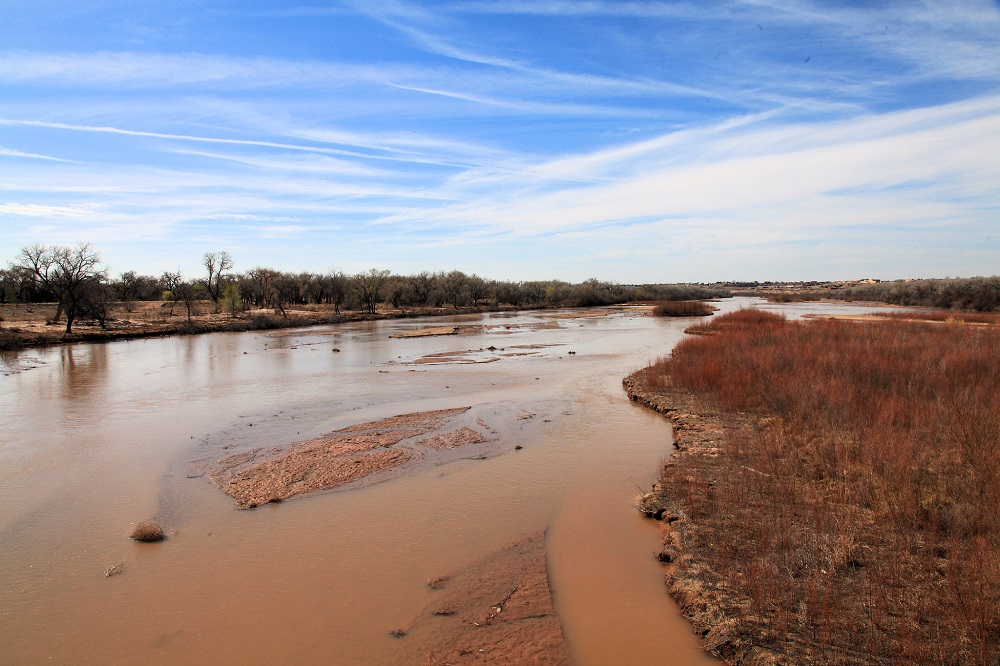With just days left of the Legislative session, advocacy groups looked back at the dismal record of passing climate change-related bills this year.
“The Legislature has failed on climate action this year,” Ben Shelton with Conservation Voters of New Mexico said.
The legislative session ends at noon on Saturday.
Conservation Voters of New Mexico, New Mexico Interfaith Power & Light, Naeva and Moms Clean Air Task Force/EcoMadres joined together in a press conference on Thursday to discuss the lack of climate action prior to going to the Roundhouse to deliver letters to the lawmakers urging them to pass some of the climate bills.
“This legislative session has been marked by dozens of bills, millions and millions and millions of dollars appropriated to address the symptoms of climate change,” Shelton said during the press conference.
Those include appropriations to help communities recover from the Hermits Peak/Calf Canyon Fire and efforts to address water scarcity and infrastructure.
“Despite all this, very little, actually no policy addressing the root cause of this, was able to get through the Legislature,” Shelton said.
Shelton said there has been a change in the Legislature this year.
Shelton said this change comes as newly elected members of the House of Representatives have been reluctant to embrace climate change legislation. Some of these members, he said, serve on the House Energy, Environment and Natural Resources Committee. That committee is often the first stop and an important hurdle for climate bills.
At the same time, he said there was growing hostility in the Senate towards climate change legislation. He said he believed some of the discussions about SB 520 highlighted a tone shift and were borderline unprofessional.
SB 520 was the Clean Future Act, which would have enacted economy-wide greenhouse gas emission goals. These goals were put in place by the governor through an executive order, but have not been codified. That means future administrations could eliminate them.
SB 520 only had one committee hearing—Senate Conservation Committee on March 7. The bill went into limbo when motions to table and motions to pass the legislation without a recommendation failed on 4-4 votes.
Another bill that failed to pass was HB 188, which would have created an Economic Transition Division to assist fossil fuel communities as the energy transition leads to less demand for oil, gas and coal.
HB 188 passed one committee, but then did not progress. At one point, there was an attempt to combine HB 188 with HB 12. This would have tied the passage of the economic transition division to carbon capture and hydrogen efforts, two things that environment supporters oppose.
Shelton and Joseph Hernandez of Naeva were part of the efforts to draft HB 188.
Shelton said HB 12 focused on advanced energy technologies and there is a lot of “politically toxic language” regarding those technologies.
“They tried to sort of force it in with deeply unpopular and controversial energy resources,” Shelton said.
Those include carbon capture, nuclear and blue hydrogen, which is produced using methane.
Shelton said advocates suggested keeping the controversial topics out of the bill and just focusing on the Economic Transition Division, as HB 188 did.
“Energy resources have been extremely contentious in the state,” he said.
Shelton said the heated, divisive debates around more controversial energy technology is not something that should be taking place during the legislative session because of time constraints.
Hernandez said that frontline communities, including Indigenous communities such as Navajo Nation Chapters, need to be involved in the discussions about hydrogen and carbon capture.
Joan Brown with Interfaith Power & Light said that “ordinary people feel like their voices aren’t being heard. We don’t know why. We just feel like we’re not being heard.”
She mentioned the Public Health and Climate Resiliency bills, SB 5 and HB 42. The House Appropriations and Finance Committee tabled HB 42 after it passed the House Health and Human Services Committee on a 6-2 vote. The House Appropriations and Finance Committee Chairman Nathan Small argued that funding is already available from federal sources to accomplish the goals of HB 42 and that there was no money in the budget to fund HB 42. SB 5 passed the Senate Health and Public Affairs Committee on a 7-2 vote and never received a second committee hearing.
This was one example of legislation that failed to pass that Brown said has contributed to people feeling like they aren’t being heard.
“People are just disappointed, it almost feels like there’s a pall over the air in our state sometimes,” she said. “And in talking with younger folks, there’s borderline depression and hopelessness.”






















